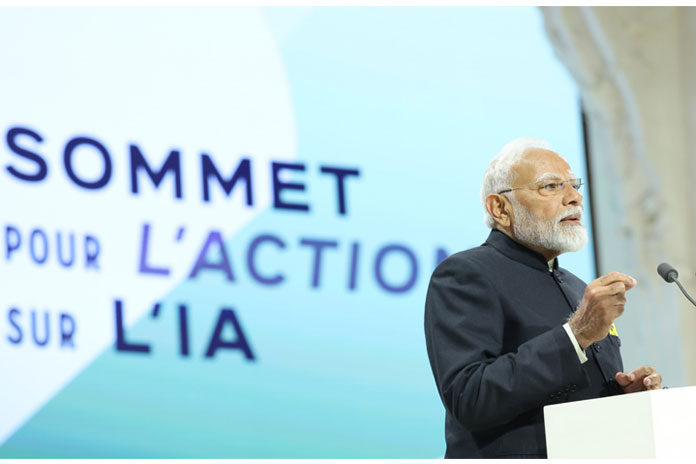Paris: Emphasising that humanity is at the “dawn of the AI age”, Prime Minister Narendra Modi delivered his opening statement as co-chair of the high stakes AI Action Summit in Paris, stating that “AI is already shaping our polity, our economy, our security and even our society. It is writing the code for humanity in the 21st century, but it is very different from other technology milestones in human history.”
The PM said “there is a need for collective effort to establish governance and standards that uphold shared values, address risks and build trust. Some people worry about machines becoming superior in intelligence to humans, but no one holds the key to our collective future and shared destiny other than us humans. That sense of responsibility must guide us.”
“AI is developing at an unprecedented scale and speed, and being adopted and deployed even faster. There is also a deep interdependence across borders” he added, saying, “Governance is not just about managing risk and rivalry. It is also about promoting innovation and deploying it for the global good. So we must think deeply and discuss openly about innovation and governance. Governance is also about ensuring access to all, especially in the Global South. It is where the capabilities are most lacking, be it compute power, talent, data, or the financial resources.”
The PM said that AI can help transform millions of lives by improving health, education, agriculture and so much more, it can help create a world in which the journey to Sustainable Development Goals becomes easier and faster.
“To do this, we must pull together resources and talent. We must develop open-source systems that enhance trust and transparency. We must build quality data sets, free from biases. We must democratise technology and create people-centric applications. We must address concerns related to cyber security, disinformation and deep fakes. And we must also ensure that technology is rooted in local ecosystems for it to be effective and useful.”
“Loss of jobs is AI’s most feared disruption,”, he said, “But history has shown that jobs do not disappear due to technology. Its nature changes, and new types of jobs are created, we need to invest in skilling and re-skilling our people for an AI-driven future.”
He said “there is no doubt that the high energy intensity of AI needs to be looked into. This will require green power to fuel its future.”
India and France have worked together for years through initiatives like the International Solar Alliance to harness the power of the Sun. “As we advance our partnership to AI, it is a natural progression from sustainability to innovation, to shape a smarter and responsible future. At the same time, sustainable AI does not only mean using clean energy. AI models must also be efficient and sustainable in size, data needs and resource requirements,” he said. “After all, the human brain manages to compose poetry and design spaceships using less power than most light bulbs.”
And, then he gave an example: “India has successfully built a digital public infrastructure for over 1.4 billion people at a very low cost. It is built around an open and accessible network, it has regulations and a wide range of applications to modernise our economy, reform governance and transform the lives of our people. We have unlocked the power of data through our data empowerment and protection architecture, and we have made digital commerce, democratic and accessible to all.”
“This vision is the foundation of India’s national AI mission. That is why, during our G-20 presidency, we built a consensus on harnessing AI responsibly for good and for all. Today, India leads in AI adoption and technical legal solutions on data privacy. We are developing AI applications for public good. We have one of the world’s largest AI talent pools. India is building its own large language model, considering our diversity, we also have a unique public, private partnership model for pulling resources like compute power. It is made available to our startups and researchers at an affordable cost,” PM Modi stated.
“And India is ready to share its experience and expertise to ensure that the AI future is for good and for all. We are at the dawn of the AI age, that will save the course of humanity,” he said.
“Some people worry about machines becoming superior in intelligence to humans, but no one holds the key to our collective future and shared destiny other than us humans. That sense of responsibility must guide us,” he added.
French President Emmanuel Macron, US Vice President J D Vance, UN Secretary-General Antonio Guterres, European Commission President Ursula von Der Leyen, Canadian PM Justin Trudeau were in the audience while PM Modi spoke.
PM Modi reached Paris on Monday to co-chair the AI Action Summit with French President Emmanuel Macron. After the AI Summit on Tuesday, followed by India-France bilateral talks, he will travel to the US. Modi will be in Washington DC on February 12-13.
The invitation to India to co-chair the AI event signals cooperation in technology, while China and the US are locked in a strategic competition in the race for AI.
After the summit ended in the afternoon, Modi and Macron attended the India-France CEOs forum meeting that was held in Paris. The meeting is expected to give a push to India-France business ties.










